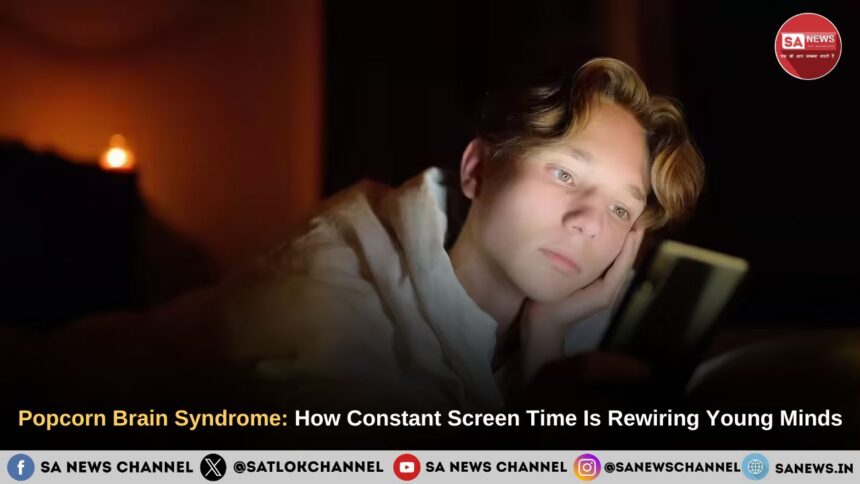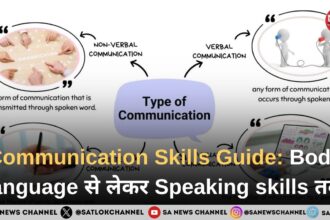The rise of Popcorn Brain Syndrome is becoming one of the most concerning digital-age challenge for Indian teenagers, young adults, and even people in their mid-thirties. With screen time hitting record highs and online stimuli constantly competing for attention, psychologists and researchers warn that the human brain is struggling to slow down, focus, and function in the offline world. Insights from Hindustan Times, Times of India, and TheFirstPost reveal a deeply layered crisis driven by digital overstimulation, rapid multitasking, structural brain changes, and emotional instability. Experts urge immediate awareness as the syndrome steadily spreads across all age groups.
- Key highlights on Popcorn Brain Syndrome and Digital Overstimulation
- The Science Behind Popcorn Brain Syndrome
- How Digital Overstimulation Rewires Focus and Emotional Balance
- Why Teenagers Are the Most Vulnerable Group
- Warning Signs That Should Not Be Ignored
- Strategies Experts Recommend to Restore Focus
- A Growing Digital Wake-Up Call for India
- The Spiritual Cause Behind Popcorn Brain Syndrome According to Tatvdarshi Sant Rampal Ji Maharaj Ji
- FAQs on Popcorn Brain Syndrome
Key highlights on Popcorn Brain Syndrome and Digital Overstimulation
- Popcorn Brain Syndrome and Modern Digital Behavior
Constant screen exposure, multitasking across apps, and rapid digital inputs overstimulate neural circuits, making the brain crave nonstop novelty.
- Expert Insights from India and Global Studies
Psychologists such as Dr. Jaya Sukul (Hindustan Times) and positive psychologist Reena Patel (TheFirstPost) explain how screens disrupt focus, attention, and emotional balance. Peer-reviewed studies from Frontiers in Psychiatry show cognitive and structural changes in young users.
- Teenagers and Young Adults at Highest Risk
With developing prefrontal cortexes, adolescents are more vulnerable to digital overload, dopamine dependency, and declining regulation skills.
Symptoms Affecting Everyday Life
Irritability, restlessness, poor sleep, mental fatigue, anxiety, and an inability to enjoy slow or offline activities are widely documented.
- Reversing Popcorn Brain Syndrome Is Possible
Digital boundaries, screen-free zones, mindfulness, and intentional device use can help the brain regain stability and focus.
The Science Behind Popcorn Brain Syndrome
According to clinical psychologist Dr. Jaya Sukul, quoted by Hindustan Times, Popcorn Brain Syndrome does not involve anything “literally popping.” Instead, it refers to a brain overstimulated by constant digital activity. She explains that young people today rapidly jump from one digital stimulus to another because their neural circuits are conditioned to expect continuous novelty. When disconnected from screens, life feels slower, dull, or insufficiently stimulating.
The Times of India highlights a 2021 peer-reviewed study published in Frontiers in Psychiatry which found that excessive smartphone use is associated with impaired emotional regulation, attention deficits, and even structural changes in the brains of adolescents and young adults. This indicates that high screen exposure does not only affect mood or concentration but may physically reshape neural pathways.
TheFirstPost further traces the origin of the term “Popcorn Brain” back to David Levy of the University of Washington, who described it as a mental state where electronic multitasking makes the offline world feel too slow. Combined with rapid content, notifications, and dopamine triggers, this lifestyle creates an environment where the brain becomes restless without constant stimulation.
How Digital Overstimulation Rewires Focus and Emotional Balance
Across all three sources, one theme stands out: the brain becomes conditioned to prefer fast, high-reward digital inputs. Times of India notes that every scroll and notification releases dopamine, reinforcing the urge to stay engaged. This reward loop reduces the ability to focus on tasks requiring sustained attention, such as studying, reading, or meaningful conversations.
TheFirstPost cites psychologist Reena Patel who describes popcorn brain as a state of “fragmented attention span, scattered thoughts, and frequent topic-switching.” This scattered mental state resembles certain ADHD-like behaviours, though it is not the same as an ADHD diagnosis. As behavioral health advisor Don Grant explained, the rapid and disjointed nature of digital processing mirrors the way popcorn bursts unpredictably.
Hindustan Times adds that overstimulation also affects sleep quality, stress levels, and emotional stability. Hyper-alertness caused by screens drains energy and increases restlessness, creating a loop where the mind struggles to calm down even when offline.
Why Teenagers Are the Most Vulnerable Group
Teenagers and young adults form the age group most affected by Popcorn Brain Syndrome. Times of India emphasizes that the prefrontal cortex, responsible for decision-making and self-regulation, is still developing during adolescence. Constant overstimulation during this phase can interfere with the formation of healthy neural pathways.
Also Read: The Rise of Cognitive Minimalism: How Over-Automation Is Forcing Humans to Relearn Focus
TheFirstPost highlights additional research showing that preschoolers who spend more than two hours a day on screens face higher risks of attention issues. Although popcorn brain primarily targets teens, both TheFirstPost and Hindustan Times note that adults aged 30 to 45 are increasingly experiencing its symptoms due to prolonged digital exposure.
Warning Signs That Should Not Be Ignored
Across all sources, the following symptoms appear consistently:
• Short attention span
• Difficulty focusing on one task
• Restlessness or mental fatigue
• Hyper-vigilance and stress
• Feeling anxious when away from devices
• Offline life feeling dull or “too slow”
• Poor sleep cycles
• Preference for online engagement over real-world interaction
These symptoms, while not classified as a medical disorder, have real-world consequences. They affect academic performance, emotional balance, relationships, and overall quality of life.
Strategies Experts Recommend to Restore Focus
Several solutions appear repeatedly across the sources, forming a clear blueprint for prevention and recovery:
1.Mindful Digital Use
Dr. Sukul (Hindustan Times) recommends intentional device breaks, screen-free zones, and mindful media consumption. Users are encouraged to ask themselves: “Who is in control, me or my phone?”
2.Focused Work Cycles
Short, uninterrupted bursts of work followed by breaks help rebuild concentration capacity.
3.Digital Boundaries
Doctors stress disabling unnecessary notifications, limiting screen use before bedtime, and taking small, regular breaks to reset dopamine levels.
4.Mindfulness and Grounding Practices
Meditation, yoga, breathing exercises, and journaling anchor the mind in slower rhythms.
5.Physical Activity
TheFirstPost cites a PLOS study suggesting at least two hours of organized physical activity per week for children to reduce screen-related harm.
6.Balanced Relationship With Technology
Experts agree that the goal is not to eliminate technology but to use it as a tool rather than becoming dependent on it.
A Growing Digital Wake-Up Call for India
Popcorn Brain Syndrome is more than a trending term. It reflects a deeper shift in how screens are reshaping attention, emotion, and cognitive development.
The encouraging part is that the brain remains adaptable. When users consciously manage digital consumption, set boundaries, and reintroduce slow, meaningful offline activities, the mind gradually relearns how to focus and rest. Popcorn Brain Syndrome serves as a warning for today’s hyper-connected world and a reminder that attention, calmness, and mental clarity can be reclaimed through mindful choices.
The Spiritual Cause Behind Popcorn Brain Syndrome According to Tatvdarshi Sant Rampal Ji Maharaj Ji
Popcorn Brain Syndrome is not just a psychological issue; it reflects a deep spiritual imbalance in today’s society. Tatvdarshi Sant Rampal Ji Maharaj explains that Supreme God Kabir created all instruments, technologies, and devices through human hands with the intention that His children could recognize Him, connect with Him, and listen to True Knowledge easily.
But in Kaal’s world the same tools are being misused. Instead of guiding souls toward devotion, technology is distracting them with endless entertainment. Children and teenagers spend hours scrolling, gaming, or watching useless content, which leads to hyper-stimulation, restlessness, and the condition known as Popcorn Brain Syndrome. Their minds become busy but empty, active but unfocused.
Tatvdarshi Sant Rampal Ji Maharaj Ji teaches that the difference between a child who watches movies for 3 hours and one who listens to Satsang for 3 hours is like the difference between earth and sky. One gets trapped deeper in Kaal’s distractions, while the other develops purity, calmness, and strong moral values. Thoughts determine destiny, and today’s overstimulated mind is losing its natural ability to think, focus, or feel peace.
In modern society people see faces but not hearts because excessive screen exposure disconnects them from real emotions and human sensitivity. The solution is not abandoning technology but using it correctly by consuming pure spiritual content, especially the divine Satsang of one & only Tatvdarshi Sant Rampal Ji Maharaj Ji, which cleanses the mind and aligns the soul with Supreme God Kabir.
For more spiritual wisdom, visit: www.jagatgururampalji.org
YouTube channel: Sant Rampal Ji Maharaj
FAQs on Popcorn Brain Syndrome
1. What is Popcorn Brain Syndrome?
Popcorn Brain Syndrome refers to a mental state caused by constant screen exposure, where the brain becomes overstimulated and struggles to focus, slow down, or enjoy offline activities.
2. What causes Popcorn Brain Syndrome?
It is caused by nonstop digital stimulation from smartphones, social media, notifications, and rapid multitasking, which overstimulate neural circuits and create dependence on fast digital stimuli.
3. Who is most affected by Popcorn Brain Syndrome?
Teenagers and young adults are most vulnerable because their prefrontal cortex is still developing, though adults aged 30 to 45 are increasingly experiencing symptoms.
4. What are the main symptoms of Popcorn Brain Syndrome?
Symptoms include short attention span, restlessness, anxiety, poor sleep, difficulty focusing, hyper-vigilance, mental fatigue, and feeling bored or stressed when offline.
5. How can Popcorn Brain Syndrome be managed?
Experts recommend digital boundaries, screen-free zones, mindfulness, device breaks, physical activity, and intentional media use to reset attention and reduce overstimulation.









